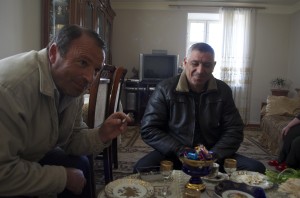Last March, I was passing through the town of Gagarin, Armenia, obviously named after the Russian cosmonaut, and I stopped to take some photographs. Typically, as I roam the countryside with camera in hand onlookers greet me warily. I imagine that the locals see this pale-faced, camera-toting, oddly dressed person as some sort of CIA or KGB type out to pad his files with photographs of the locals. There is a popular saying in Armenia that “the KGB is still watching,” which may in fact be true, although technically the initials have changed.
But this time, through the voice of my Georgian taxi driver who was doubling as my translator, I was invited into one of the homes of some random on-looker, greeted with a warm cup of Armenian coffee, a shot of home-brewed alcohol, and a ridiculous amount of food that arrived magically from the quiet, near toothless woman who seemed just delighted to make total strangers feel at home.
I was told a story in Russian about how “in Soviet times” people were happier; they were working and could take a month off to holiday in Moscow or some distant city. Now they have to travel to Moscow just to try to find work, because there is little for them to do in the corrupt, post-Soviet Union independent oligarchical state of Armenia.
My translator told me that the spectacled, cigarette wielding man whose house we were invited into told him that perhaps this American “photographer” could write about the plight of the people in Gagarin, people who struggle to find dignity despite unemployment and abject poverty, about how they once were part of a community that manufactured clothing and served a purpose in the world.
I don’t understand really why I feel so at home in Armenia, but perhaps this tradition of hospitality has something to do with it. I am not Armenian, yet I feel called to the country in ways my intellect can’t fathom. In a country where the police will stop you randomly and argue until you reach a “settlement,” where there are two ways to do nearly everything (the official way and the way that gets you results), where winters can be bitter cold and poverty outside the capital is rampant, people still walk the streets arm in arm until all hours of the morning, and will invite you into their homes to eat and drink with their families. Somehow when I am here I feel as though I belong here, and when I am gone I miss it.
The reason that I am drawn to this place is a mystery. Maybe it is the same thing that once drew me to Ireland; the suffering that lies just beneath the surface, or maybe it’s just the cheap beer. I don’t know. But clearly, the culture of hospitality runs deep. It ‘s difficult not to feel welcome.

